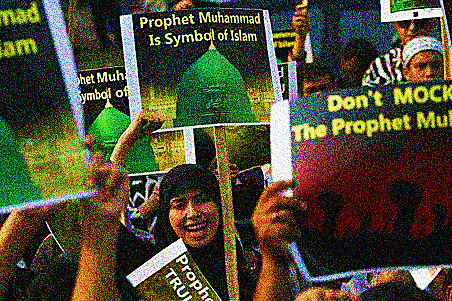It’s a mistake to assume that, because Islam permits individuals to commit violence in response to representations of Muhammad, the filmmaker of “Innocence of Muslims” knew murder might be a consequence.


It’s a mistake to assume that, because Islam permits individuals to commit violence in response to representations of Muhammad, the filmmaker of “Innocence of Muslims” knew murder might be a consequence.
The deadly attack on U.S. diplomatic personnel in Libya calls into the question the efficacy of the NATO intervention in Libya.
The cold, dead hand of Salafi extremism was once again on display in Benghazi.
First, threats to burn the Quran, now this.

The visual landscape of the Arab World has changed greatly as various forms of creative expression have flourished in the days since the Arab Spring. Graffiti and street art not only played a distinct role in the political dissent of this revolutionary period. Art has also been an ongoing experience for the revolutionary youth that is strengthening civil society and the democratic process.

Libya’s transition to democracy will require far more than a peaceful and democratic election. The legitimacy of the elected government depends on its capacity to disarm local militants while ensuring all Libyans’ security, effectively distributing Libya’s petro-wealth and specifying Islam’s role in governance. The resolution of these polarizing and controversial issues — peacefully within the framework of democratic institutions or through continued violence and authoritarianism — will define the post-Gaddafi era in Libya.
The militia left the airport but the commander wasn’t released.

French President Nicholas Sarkozy’s opponents have not attempted to capitalize on this investigation in their campaigning, instead focusing their criticism on Sarkozy’s austerity and immigration policies.
Many fear that militias will interfere with Libyan elections.

The Congress for the People of Cyrenaica, which was held in eastern Libya’s largest city, Benghazi, attracted international attention after the group demanded greater autonomy from the central government in Tripoli and a reversion to the federal Libya that existed in the 1950s.